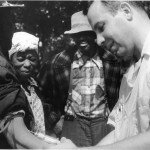Ending racism starts with educating youth
Talk About Race — By Mike Barber on December 22, 2009 at 1:43 pmEngaging with issues regarding race and racism are critical in the fight for social justice. Due to the inherent complexities of such discussions, they easily become minefields for those who would casually wander such terrain. Two salient examples of such dilettantism from this past week are Lisa Solod Warren and MTV News (Canada).

Lisa Solod Warren (www.lisasolodwarren.com)
On December 16th, 2009, an article posted on The Huffington Post by Virginia-based author Lisa Solod Warren stirred up a whole lot of justifiable anger from the public. Both people of color and whites were expressing offense to Warren’s article titled Two Black Role Models Done in by Hubris (removed from HuffPost posted in a forum here) in which the author draws racialized parallels between US President Barack Obama’s waning public support and Tiger Woods’s sex scandal. The article—which has been overwhelmingly panned throughout Internet blogs, forums and Twitter as both condescending and racist—was removed from both The Huffington Post and Salon.com within two days of its publication. I managed to find the first paragraph still online:
“In the past few weeks, the two most famous and arguably most successful black men in America have taken a huge fall. It has become clear that both pro golfer Tiger Woods, just named Athlete of the Year by the Associated Press, and the American president, Barack Obama, the first black person to lead the country, suffer from a surfeit of hubris which has finally caught up with them. If both men somehow thought they were untouchable, they have been put to right. Both have crashed to earth and it may well be true that they can never recover their earlier status again.”
I’m not going to spend time here picking apart each erroneous statement; that’s beyond the scope of my article (though I do strongly recommend reading Sister Toldja’s visceral commentary and response “Put To Right”: Lisa Warren and the Liberal White Hood). What I want to discuss is Warren’s first mistake in writing the article, which is what many white authors tend to do when broaching the subject of race: neglecting to check her privilege.
For white people wanting to become sincere allies in the fight for racial justice, they need to acknowledge the white privilege that underscores their position in our racially stratified society. It’s not an easy process, and to be honest it is a life-long one; but constant mindfulness of white privilege is fundamental in order that white journalists become allies. In order for a white person to write about race with any credibility or competency, they need to go through the same personal confrontation. Otherwise, they are setting themselves up to repeat the same racist attitudes with which they’ve been programmed throughout a lifetime of privilege.
I and many others don’t believe that Warren was being intentionally offensive in her writing, but then again racist thought, or a racist perspective, is seldom intentional. Part of the definition of white privilege is color-blindness. It could have been in the most well-meaning of spirits that Warren set forth to write the article, but the consequences of her words were hurtful and offensive. Intentions can be good and sincere, but they don’t mean a thing if the resulting work leads to exacerbating the situation instead of helping it, which brings us to MTV News.
I’m not a fan of MTV by any stretch of the imagination (I don’t even get cable). I only became aware of MTV host Aliya Jasmine when she posted this on Twitter back in late November:
“Speaking @ Diversity conference for high school students in Toronto this morning. Canada is multi-cultural, but does RACISM still exist?”
I find the very framing of the question extremely troubling. To me, and dare I say most adult Canadians not living inside a bubble, the existence of racism in Canada is not open to debate at all. Racism’s existence in Canadian society is an absolute fact. Though it doesn’t get reported nearly as often as it occurs, racist violence in Canada does get occasional newspaper coverage. While they ostensibly aren’t as prevalent as they were back in the early 90’s, Canadian white supremacist and neo-Nazi skinhead groups are still around. Stories of racism amongst members of our military and first responders still creep up in the media. In fact, a 2007 Canadian study found that “fifty-nine per cent of Quebecers admit to being racist to some degree [while] only 47 per cent of those outside Quebec say they are racist to some degree.” The very idea that racism’s existence in Canada is up for grabs is as offensive and ignorant as if asking “did Nazi concentration camps really exist?” The answer to both questions is an overwhelming and document-supported YES.
On its December 14, 2009 Canadian edition, MTV News broadcast the footage from the November 17th conference Jasmine mentioned in her tweet. It was sponsored by the Canadian Centre for Diversity and had a panel of young adults, including Jasmine, talking to a group of high school students in Toronto about prejudice. For its newscast, MTV News aired some of the students responding to the question “does racism still exist in Canada?” (Watch the newscast online — it’s the fourth segment.) Engaging students on issues of racial justice is critical, and while MTV News may have had good intentions with this piece, they ended up doing more harm than good.
The first student’s response to the question is “wherever there are a lot of cultures and races, there’s going to be discrimination.” On the surface that appears to make sense. But research has shown that differences in skin color itself does not logically lead to racism. Diversity trainer Jane Elliot’s “Blue Eyes/Brown Eyes” exercise demonstrated that “prejudice and bigotry [are] an irrational class system based upon purely arbitrary factors.” While the young student can’t be faulted for her answer, the people at MTV News didn’t help at all by repeating the falsehood, thereby perpetuating the myth that racism is a natural consequence of diversity.
MTV News’s naiveté is not surprising considering the source. Let’s be real: the network which brings us “Jersey Shore” is not going to engage complex racial issues with any degree of competency. Regardless, their dilettantish attempt at discussing racism gave nothing to their young viewers to actually think about. Worse, their “shucks, ain’t it a shame racism is still around?” puff piece reinforced the misconception of racism as something natural, prompting viewers to conclude that it’s human nature to be racist — which in turn makes them less inspired to fight back against racism and more likely to embrace it. This is clearly not helping.
The young students can’t be blamed for their naiveté because they’re not being given the tools needed in order to think critically about racism. Their minds are being hamstrung from identifying or understanding racism in the present because they are not being taught racism’s roots in the past.
As I mentioned in my last article, I am currently working on a documentary film titled A Past, Denied: The Invisible History of Slavery in Canada. One of the recurring themes in Canadian life my film sets out to confront is the general denial about our (Canadians, that is) slave past. During its first 200 years, Canada—like the US—relied on slave labour; and like in the United States, it was a prevalent part of our society. Yet despite its pivotal role in the establishment of the first colonies in Nouvelle France (now Québec) in the late 1600’s and ubiquitousness in day-to-day Canadian life until its abolishment in the 1830’s, Canada’s role in the transatlantic slave trade and its slavery of Aboriginal and African people completely escapes mention in our history textbooks and classrooms.
The result of this is slavery’s total absence from our national historical narrative and our collective social conscience—except, of course, for the bits that make us look and feel good vis-a-vis the American Civil War and the fight to abolish slavery there. Canadians, for the most part, are kept ignorant about the roots of racism and white privilege in our own country.
 If we’re going to be serious about ending racism, we have to get serious about educating young minds about the various forms of racism and how they manifest. We also need to talk openly about white privilege and how it persists. Through teaching a more complete (and less biased) history, we arm students with the tools and knowledge to better engage complex issues like systemic racism and white privilege and to hopefully solve them rather than contribute to their insidiousness.
If we’re going to be serious about ending racism, we have to get serious about educating young minds about the various forms of racism and how they manifest. We also need to talk openly about white privilege and how it persists. Through teaching a more complete (and less biased) history, we arm students with the tools and knowledge to better engage complex issues like systemic racism and white privilege and to hopefully solve them rather than contribute to their insidiousness.
Author: Mike Barber (4 Articles)
Mike Barber is an independent filmmaker with a particular interest in issues surrounding social justice. He is currently directing “A Past, Denied: The Invisible History of Slavery in Canada,” a feature documentary exploring how a false sense of history—both taught in the classroom and repeated throughout the national historical narrative—impinges on the present. It examines how 200 years of institutional slavery during Canada’s formation has been kept out of Canadian classrooms, textbooks and social consciousness. He is currently based in Montreal, Quebec. You can follow him on Twitter at http://twitter.com/apastdenied (@apastdenied)



 Share This
Share This Tweet This
Tweet This Digg This
Digg This Save to delicious
Save to delicious Stumble it
Stumble it








 Pray for Obama? race, hate and money
Pray for Obama? race, hate and money A New Lesson from the Old "Tuskegee" Study
A New Lesson from the Old "Tuskegee" Study Learning to ignore the hate mongers
Learning to ignore the hate mongers Colorblind?
Colorblind?


